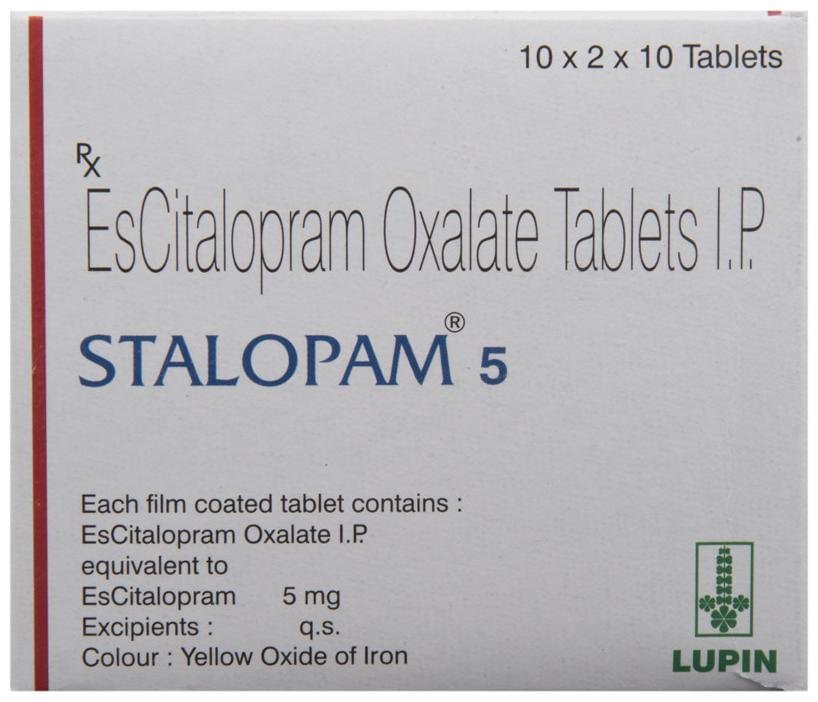Escitalopram 5 mg Tablet, marketed under the brand name Stapalom, is a widely prescribed medication for the treatment of various mental health disorders, particularly depression and anxiety. As a selective serotonin reuptake inhibitor (SSRI), it works by enhancing serotonin levels in the brain, which can lead to improved mood and emotional stability. This article will explore the role of Escitalopram 5mg in mental health treatment, examining its mechanisms, efficacy, benefits, risks, and considerations for use.
Understanding Escitalopram 5mg
- Classification: Escitalopram is classified as an SSRI, which is a category of antidepressants that increase the availability of serotonin in the brain. SSRIs are known for their relatively favorable side effect profiles compared to older antidepressants.
- Chemical Composition: It is the S-enantiomer of citalopram, making it more potent and effective at lower doses. This specificity allows for a more targeted approach in treating mood disorders.
- Dosage Forms: Escitalopram is available in several strengths, with 5mg being a common starting dose for many patients. This flexibility in dosing helps healthcare providers tailor treatments to individual patient needs.
Mechanism of Action
Escitalopram 5mg functions primarily by:
- Inhibiting Serotonin Reuptake: By blocking the reabsorption of serotonin in the brain, Escitalopram increases the concentration of this neurotransmitter in the synaptic cleft, enhancing mood regulation.
- Neurotransmitter Regulation: In addition to serotonin, Escitalopram may influence other neurotransmitters, contributing to its overall antidepressant and anxiolytic effects.
Indications for Use
Escitalopram 5mg is indicated for several mental health conditions, including:
- Major Depressive Disorder (MDD):
- Escitalopram is effective in treating the symptoms of MDD, such as persistent sadness, loss of interest, and fatigue.
- Generalized Anxiety Disorder (GAD):
- Patients with GAD often experience excessive worry and anxiety, which Escitalopram can help alleviate.
- Obsessive-Compulsive Disorder (OCD):
- The medication can assist in managing obsessive thoughts and compulsive behaviors.
- Panic Disorder:
- Escitalopram is beneficial for individuals experiencing panic attacks and the anxiety associated with them.
- Social Anxiety Disorder:
- It can help reduce anxiety in social situations, improving overall social functioning.
Benefits of Escitalopram 5mg
- Efficacy: Numerous studies have demonstrated the effectiveness of Escitalopram in treating depression and anxiety, often showing significant improvement within a few weeks of initiation.
- Tolerability: Many patients tolerate Escitalopram well, with fewer side effects compared to other antidepressants.
- Convenience: The 5mg dosage is suitable for patients who may be sensitive to medications, allowing for individualized treatment plans.
- Quality of Life Improvement: By alleviating symptoms of depression and anxiety, Escitalopram can enhance patients’ overall quality of life, enabling them to engage more fully in daily activities.
Risks and Side Effects
While Escitalopram 5mg is generally well-tolerated, it may cause side effects in some individuals. Common side effects include:
- Gastrointestinal Issues:
- Nausea, diarrhea, and constipation are frequently reported.
- Central Nervous System Effects:
- Drowsiness, insomnia, and dizziness can occur, impacting daily functioning.
- Sexual Dysfunction:
- Patients may experience decreased libido or difficulty achieving orgasm.
- Weight Changes:
- Some individuals may notice weight gain or loss during treatment.
- Withdrawal Symptoms:
- Sudden discontinuation of Escitalopram can lead to withdrawal symptoms such as irritability and flu-like symptoms.
Long-Term Considerations
- Dependence: While Escitalopram is not considered addictive, some patients may develop a psychological dependence on it.
- Cognitive Effects: There are concerns about the long-term impact of SSRIs on cognitive function and memory, particularly in older adults.
- Bone Health: Some studies suggest a potential link between long-term SSRI use and an increased risk of osteoporosis.
Precautions and Contraindications
Before initiating treatment with Escitalopram 5mg, it is essential to consider the following:
- Medical History: Patients should disclose any pre-existing conditions, especially liver or kidney issues, to their healthcare provider.
- Medication Interactions: Escitalopram can interact with other medications, including MAO inhibitors and other SSRIs. A thorough medication review is crucial.
- Pregnancy and Breastfeeding: The use of Escitalopram during pregnancy or breastfeeding should be discussed with a healthcare provider, as it may pose risks to the mother and baby.
- Age Restrictions: Escitalopram is not approved for pediatric use, and its use in geriatric patients should be carefully monitored.
Patient Education and Support
To ensure optimal treatment outcomes, patients should be educated on the proper use of Escitalopram 5mg, including:
- Dosage and Administration: Patients should understand the correct dosage and administration schedule to minimize side effects and maximize efficacy.
- Monitoring and Follow-up: Regular follow-up appointments with a healthcare provider are crucial to monitor treatment progress and adjust the dosage as needed.
- Lifestyle Modifications: Patients should be encouraged to adopt healthy lifestyle habits, such as regular exercise, a balanced diet, and stress management techniques, to complement their medication regimen.
Conclusion
Escitalopram 5mg (Stapalom) is a valuable treatment option for various mental health conditions, offering a range of benefits and a relatively tolerable side effect profile. However, it is crucial to weigh the potential benefits against the risks and consider individual patient factors, such as medical history and medication interactions. By understanding the role of Escitalopram 5mg in mental health treatment, healthcare providers can make informed decisions and provide optimal care for their patients.
